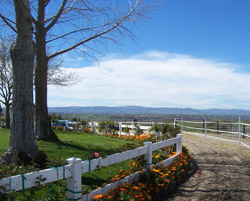Spring may be late in many parts of the country this year, but horse owners don’t want to be late with preventative fly control practices, according to Laurie Cerny, publisher of www.good-horsekeeping.com, a website devoted to practical horse care.
“You don’t want to wait until it’s 85 degrees out and with humidity to match to think about fly control,” Cerny said. “Early prevention is key to having fewer flies around your horses and stable this summer.”
Here are some things you can do now to be ready for fly season:
1. Harrow pastures (break up manure piles) and muck out dry lots or pens. This might also mean bringing in some new sand for areas that have been saturated with manure and urine. Stalls and run-in sheds should also be stripped of old bedding. Old manure, dirty bedding, and feces saturated soil will all attract flies and insects once the temperature increases.
2. Remove, or eliminate potential fly havens. This means anything that holds water after a rain like empty pails, grain pans, and unused water tanks. Filling in dips in pens will also help reduce places for standing water; simply raking these spots as the water dries will also help dry the area out.
3. Feed garlic, or add apple cider vinegar to your horse’s water or grain. Feeding garlic helps deter biting insects. Cider vinegar is also believed to do the same thing when added to your horse’s drinking water or grain. It can also be added to rinse water when bathing your horse, which will act as an external repellent.
4. Use fly predators. These little insects are very helpful in reducing the number of flies on your property. The key is to use them correctly and to have your first order shipped early enough in the season. Once flies have begun to hatch out, it’s more difficult to break their reproductive cycle.
5. Have barrier/repellant products stocked and ready to use before you need them. Make sure that you have fly masks and sheets ready to go before you see your first flies. When using sheets and masks from last year check for tears and rips and either mend these spots, or replace them altogether. Have at least one-month’s supply of fly spray for both your horses and for your barn on hand.
For more horse care information go to www.good-horsekeeping.com.


